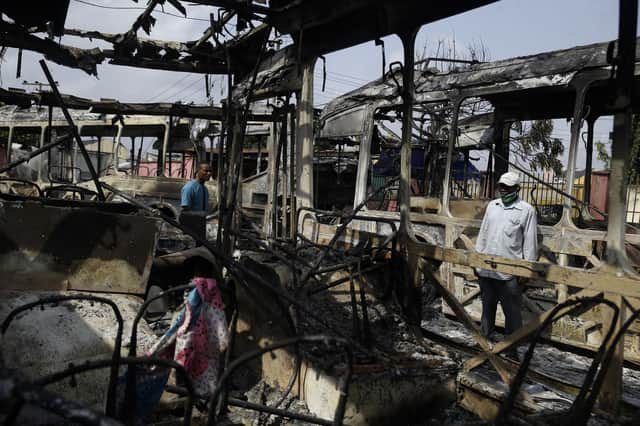Why Scots should pay attention to what's happening in Nigeria - Ayeni Adekunle


It’s a rich, complex history that one piece cannot do justice to. But I’ll attempt to provide an introduction that I hope will lead every Scot to go searching, especially as the military violence against young Nigerians is making the world cringe.
On October 1, Nigerians celebrated the 60th anniversary of our country’s independence from British colonial rule. Exactly one week later, young Nigerians, who make up more than 70 per cent of the country’s population were out on the streets, protesting against police brutality, and demanding that government disband a criminal police entity named SARS.
Advertisement
Hide AdAdvertisement
Hide AdThe Special Anti-Robbery Squad (SARS) was created in 1992 as a tactical unit to deal with increasing cases of armed robbery and related crimes like kidnapping and internet crime.
SARS has done a lot of good, bringing crime syndicates to their end, and working with intelligence and police units in Nigeria and abroad to cripple the activities of fraudsters.
But one mistake can lead to irreversible damage.
According to a June 2020 report by Amnesty International, there have been more than 80 documented cases of police brutality in Nigeria since 2017. At least 56 people were killed last month alone, since the ENDSARS protests started. There are no records of prosecutions or convictions.
Yet after 12 days of peaceful, powerful protests, young Nigerians were met with violence.
I followed the protests with obsession, from my home in Edinburgh. I sent out tweets commending the decentralisation, the organisation and the self-regulation. But the government’s response worried me.
Would the federal government of Nigeria see this as an excellent opportunity to rebuild the national pride that most Nigerians have lost? Would the president demonstrate that this time he’s not just paying lip service to the demands? Would the Inspector-general of police resign? Would all identified criminal officers be arrested and prosecuted? Would Nigeria seize this moment?
The answer came to me in the form of a live Instagram broadcast on the night of October 20. I watched as young Nigerians, carrying the country’s flag, and singing the national anthem, were shot at by men of the Nigerian army.
The peaceful protests had taken a violent turn in the past couple of days, no thanks to overzealous policemen.
Advertisement
Hide AdAdvertisement
Hide AdThere are unconfirmed allegations that the introduction of violence was a needed preamble for government to shut down the protests. As violence increased in Benin, Lagos and elsewhere, the announcements of curfews kicked in.
In Lagos, at 11:49am, the governor announced a 24-hour curfew to start at 4pm. Later on about 7pm, his office announced belatedly the curfew would now start at 9pm.
The military attack on protesters at Lekki toll gate happened about 7:30pm. We are yet to be told what their crime was, and what part of the constitution stipulates a death penalty without trial.
Nigeria is a complicated country - and most of this comes from how the country came to be.
I did not know much about my country’s history until I attended university, where I had access to a good library for the first time.
I left university almost 20 years ago, yet I am still learning about Nigeria’s history. It’s not taught in schools, few books paint a deep picture, and the government would not approve of films that seek to interrogate our history.
Even the civil war, which almost wiped out an entire tribe, is yet to be adequately documented.
This war was between 1967 and 1970, seeing over three million people officially massacred. Yet the world knows everything there is to know about the Rwandan genocide of 1994, even as the country continues to use that history to make sure it does not happen again.
Advertisement
Hide AdAdvertisement
Hide AdScotland, which has been my family’s home for some three years now, is perhaps the reason why Nigeria exists as it is.
And Scots, many of whom were not alive when Nigerian was annexed and eventually colonised, and who may not have been exposed to this history, need to pay more than a passing attention.
After all, it was a Scot, George Taubman Goldie, who conceived the idea of the British Empire’s adventure into the region, leading to the formation of the United African Company, which held British commercial interests in the Niger.
He would later become governor of the Royal Niger Company, running what is today considered ‘Nigeria’. The work he started was completed by Frederick Lugard, who oversaw the conquering of Nigeria, the full colonisation, and the amalgamation that gave birth to the new country.
Nigeria has the potential to be a great country.
We have an ambitious, energetic, and passionate youth population. We have human and natural resources that many countries seek; and we have a population size larger than any other black nation on earth.
If we are able to achieve our full potential, it should be a thing of pride for every Scot, seeing the role this country played not only in the creation of Nigeria, but also in the modernisation of the culture thanks to the likes of Mary Slessor (also a Scot) who fought for women’s rights and stopped the killing of twins in eastern Nigeria.
It should be a second home for every Scot, seeing that it is warm all year – and that is just one of the many things that should lure a Scot here.
But, with the violence we have witnessed this month, with the increasing police brutality and government high handedness, I fear that we are entering a stage where many Nigerians are entertaining that perennial thought about sovereignty and whether there’s a compelling need to renegotiate the outcome of one single giant Nigerian nation.
* Ayeni Adekunle is a Nigerian writer and entrepreneur living in Edinburgh.
Comments
Want to join the conversation? Please or to comment on this article.